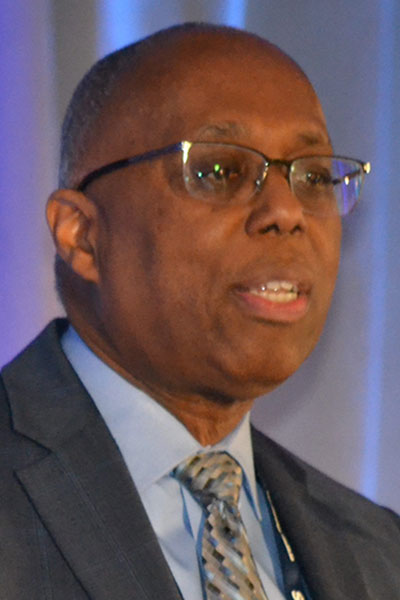The Diversity Forum welcomed Horace Delisser, MD, associate professor at the University of Pennsylvania Perelman School of Medicine, who shared his diversity, equity, and inclusion experiences with an enthusiastic audience.

Dr. Delisser has been doing work with DEI in some form throughout his entire career, but particularly in the past 11 years in his role as associate dean for Diversity and Inclusion in Medical Education at Perelman.
As a scientist and educator, he’s worn many hats, including principal investigator and curricula and pedagogy developer. But his DEI efforts were always woven in among his accomplishments. He created pathway programs to medical school for undergraduate students from underrepresented, disadvantaged, and marginalized backgrounds. His research program has given him the chance to provide opportunities and mentorship for medical students to post-doctoral scholars, with an emphasis on trainees from underrepresented populations.
“All these efforts were initiated by and done in collaboration with passionate, creative, thoughtful students and trainees,” Dr. Delisser said. “In the words of the immortal James Brown, ‘I feel good’ when I reflect on my career.”
The reality of our times has tempered his good feelings, though.
“DEI is under assault in the wider society and in medicine,” he said. “DEI may have only three letters, but it has become a four-letter word to many.”
Dr. Delisser cited several examples, including one from his own colleague, from books, and legal challenges that villainize DEI efforts. The U.S. Supreme Court has heard two cases regarding undergraduate admissions and race, and Dr. Delisser pointed out that decisions in these cases could affect the diversity at medical schools. He also referred to state legislation recently signed by Florida Gov. Ron DeSantis that bans the state’s public colleges and universities from spending money on DEI programs.
“Rather than being dismissive of the critiques, we should reflect on what we do in this space, and how we can do it better,” he said.
He shared several imperatives that he believes are necessary to weather the climate of hostility and challenge.
He proposed reframing DEI as an opportunity for excellence, both in medical education and patient care. He promoted the idea of relational competence as a means of providing patient-centered, equitable care, where the provider and the patient exchange narratives — their journeys and stories — which also allows them to share cultural identities. These are all shaped by structural processes.
“In offering this concept, this is not to dismiss the need for structural, systemic change so much as to offer an outline through which an individual provider can frame their work around equity,” Dr. Delisser said.
Rigor and evidence-based results are essential because lack of evidence makes DEI efforts vulnerable to the challenges of critics. He advised respiratory health professionals to acknowledge the gaps in their knowledge and resist citing weak studies just because they offer some support for their beliefs.
“We can move the field forward by developing robust metrics and doing rigorous studies,” he said.
In line with pursuing rigorous and evidence-based work, Dr. Delisser posited the concept of operating with integrity, authenticity, and sincerity rather than being performative, hypocritical, or inconsistent.
He also reminded attendees to assume goodwill on the part of critics because their intent might be misconstrued.
“Being open to dialogue, hearing the critique, listening with curiosity, and an initial assumption of goodwill — I believe these provide at least the potential for an opportunity to inform and influence,” Dr. Delisser said.
His final message was simple: Remain hopeful, despite the challenges and hostility.
“I am by nature an optimist, so there may be a degree of wishful thinking,” he said. “But if we reclaim DEI as a pursuit of excellence, collaborate more, and compete less, I do believe we can get through this challenging time in a much stronger position.”
Extend Your Learning Beyond San Francisco with ATS 2025 Conference Highlights

With so many valuable educational opportunities offered during the ATS 2025 International Conference, attendees are often forced to decide which sessions to prioritize. That’s why the Society is offering three ATS 2025 Conference Highlights packages for those unable to attend ATS 2025 San Francisco or attendees interested in continuing their education after the conference. Check out the packages and pick the one that’s right for you. Learn at your own pace, whenever and wherever you are!

